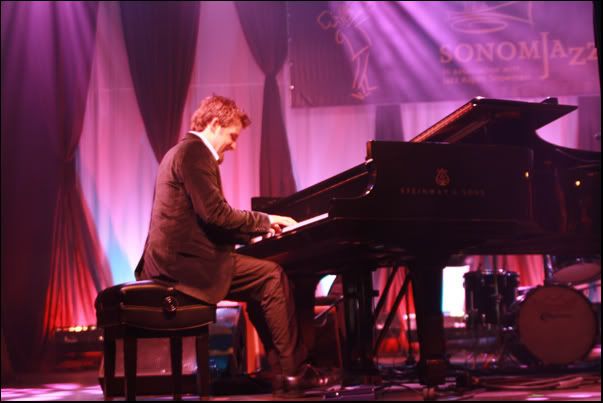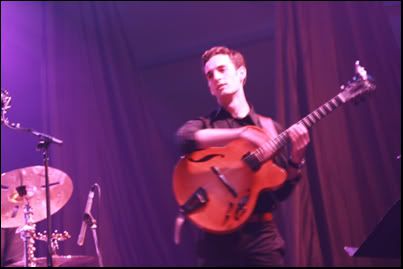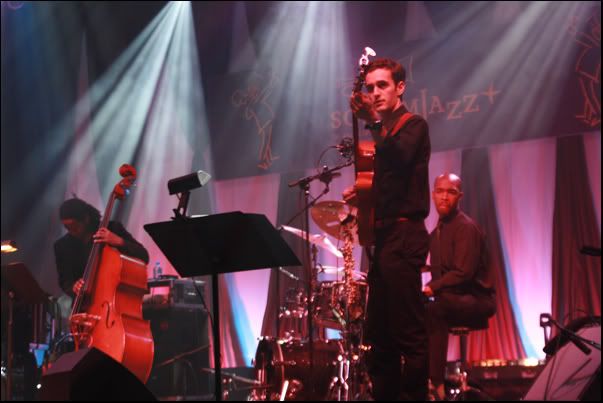
Taylor Eigsti talked nervously. Wouldn’t you, in front of a 3,000-seat tent with only a few hundred people in it? His buddy, Julian Lage, looked at him, looked out into the expanse. Laughed.
Then Eigsti sat down, punching out spare, discordant notes on his piano, as if in a musical deterioration of how eerie the whole thing was. Lage responded by picking out high-pitched chirps from his guitar strings below the bridge, and eventually, Ben Williams and Eric Harland sidled in. Out of all this, a song eventually self-sculpted: Cole Porter’s “I Love You,” full of wit, verve, dramatics and a fleeting debt to Bill Evans.
Another amazing night by Taylor Eigsti and Julian Lage was underway.
For some reason, I turn into a 1960s television host when talking about Eigsti and Lage. These kids, they’re a real gas, just righteously groovy. I go ape for ’em, you dig?
I wasn’t alone: at the finish of the group’s next tune, “Time Lines,” a thundering, raging storm of full-fingered jazz, the crowd jumped immediately to their feet. There’s something so beautiful and weird and gratifying about watching a huge tent that’s only 30-percent full going absolutely bananas for the relative unknowns, and especially when those unknowns are ruling as hard as Eigsti and Lage.
 Eigsti is 23, Lage is 20, and people can talk all they want about young players only studying theory and technique and recycling old ideas in place of emotion—it’s just not true with these two. They’ve got an emotional depth that goes acres deep. I’d seen this on display as a duo before, but with Williams and Harland they were a powerhouse. Though the two did play some duets together, the bluesy “And What if I Don’t” by Herbie Hancock and the original composition “True Colors”—and offered an introspective take on the surprise indie-rock tune of the set, the Eels’ “Not Ready Yet” (!)—the two truly shined in a full-force setting.
Eigsti is 23, Lage is 20, and people can talk all they want about young players only studying theory and technique and recycling old ideas in place of emotion—it’s just not true with these two. They’ve got an emotional depth that goes acres deep. I’d seen this on display as a duo before, but with Williams and Harland they were a powerhouse. Though the two did play some duets together, the bluesy “And What if I Don’t” by Herbie Hancock and the original composition “True Colors”—and offered an introspective take on the surprise indie-rock tune of the set, the Eels’ “Not Ready Yet” (!)—the two truly shined in a full-force setting.
Through every open door, both Lage and Eigsti tiptoed carefully; the majority of their solos began with sparse hesitation, a note here, a run there. Feeling out the field. Wayne Shorter’s “Deluge” saw Lage open his solo with palm-muting intermittent bent notes on the fretboard, which slowly unraveled into more loosely muted hammer-ons, which eventually unraveled into a full-speed-ahead trek both in and out of the scale, going by so fast it was impossible to completely grasp.
Harland must have been in on this plan, too, because he’d take eights like this: 1) rubbing his stick end on the bell of his ride, and 2) same thing but with some bass drum, and 3) rim shots mixed with toms building up to 4) ending by wailing away. Mas y mas.
Yes, these dizzyingly executed extended crescendos abounded, even amongst all four members. “Caravan,” the set’s closer, opened with what Lage calls “my only toy”—a delay pedal, used with flat-fifths and slides and layered rhythms—while Eigsti reached inside the grand piano and dampened the strings with one hand, pounding out fast notes with the other. I’m of the belief that there’s no lousy way to play “Caravan,” but this was on some other shit entirely; Eigsti’s marathon solo, in particular, was unleashed like he was hungry, ravenous, stabbing at the keys. It was so impactful that the crowd started cheering in the middle and didn’t let up until the triumphant end minutes later.
 Eigsti’s group—this same quartet—is playing tonight at Yoshi’s in Oakland and tomorrow at Yoshi’s in San Francisco. Go, go, go. Also, Eigsti has a new album out this week called Let It Come To You, and it features incredible performances that come damn close to capturing his live show. So well, in fact, that I’ll forgive the goatee.
Eigsti’s group—this same quartet—is playing tonight at Yoshi’s in Oakland and tomorrow at Yoshi’s in San Francisco. Go, go, go. Also, Eigsti has a new album out this week called Let It Come To You, and it features incredible performances that come damn close to capturing his live show. So well, in fact, that I’ll forgive the goatee.
Also, be sure to check out Lage’s trio when they open for Charlie Haden and Joshua Redman at the Raven Theater on June 7 as part of the Healdsburg Jazz Festival.
TRENDING:







